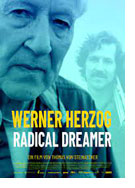

Opening 27 Oct 2022
Directed by:
Thomas von Steinaecker
Writing credits:
Thomas von Steinaecker
German director Thomas von Steinaecker has fashioned a very comprehensive portrait of equally complicated Werner Herzog and his wide-ranging atypical career. The German film director, screenwriter, truth seeker, author, producer, actor, voice artist, opera director and doomsayer guides us through his past, adding personalized antidotes and quips. Sites visited are diverse – where the family lived as refugees in Upper Bavaria after fleeing Munich during the Second World War to filming sites in Germany. Also, his favorite haunts in Los Angeles where he has lived since 1996. Location clips and archival material from films reaffirm Werner’s “insider” information. Collaborating facts, commentary and different points of view regarding Werner and his films/mindset are elicited from a wide range of family, actors, friends and colleagues “It’s impossible for anyone else to see things the way he does,” says Robert Patterson.
His 1968 prizewinning short film Letzte Worte (Last Word) clip is funny; nevertheless, “No one took me seriously…too young,” laments Werner. Wim Wenders’ summation, “The cinema of the ‘60s was a fiasco.” Considered a pioneer of New German Cinema—together with Wenders, Volker Schlöndorff and others, Werner adds, “Thank god we all had individual styles.” He met the highly respected film critic/archivist Lotte Eisner (archival clips) whom was his mentor and narrated Fata Morgana, 1971. Moreover, Herzog eats his shoe (Les Blank Retrospective, 1980 and screened at Hamburg’s 2012 Kurzfilm Festival), walked to Paris from Munich to save a friend, has a vivid imagination “I really wanted to fly,” and has a representation of his soul, “that’s me,” in nature.
Herzog’s relationship with the notoriously difficult actor Klaus Kinski began while directing Aguirre: The Wrath of God (Aguirre: Der Zorn Gottes, 1972) in rugged Peru; they clashed intensely. Losing his lead in 1982 a desperate Herzog hired Kinski for the epic-drama Fitzcarraldo, adding to the troubled production’s woes of conveying a 320-ton steamship over a steep hill in the jungled Amazon Basin. Herzog declined indigenous Machiguenga extras offer to kill Kinski, albeit Wenders remembered “Werner was very proud when he saw Fitzcarraldo.” Their fifth/final collaboration was Cobra Verde (1987) about a West Africa slave trader; personality conflicts and Kinski’s flare-ups plagued the production.
The expression “A prophet is not without honor save in his own country” came home to roost when Herzog’s documentary Lektionen in Finsternis (Lessons of Darkness) screened at Berlinale Film Festival, 1992. Loudly booed and spat upon provoked Herzog’s move to USA. “Here people don’t just talk about things, they actually do it.” As he did: Grizzly Man (2005), The Bad Lieutenant: Port of Call - New Orleans (2009), On Death Roll (TV series, 2012-13) et al.
Through his everyday life audiences get a sense of the contemporary iconic artist, Werner Herzog – Radical Dreamer. (Marinell Haegelin)